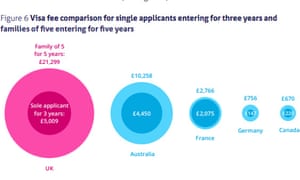The UK’s “sky-high” visa fees could deter vital NHS staff and the “brightest and best” scientists that Boris Johnson wants to attract with his new immigration policy, experts have warned.
Nurses, lab technicians, engineers and tech experts who currently flock to the UK from the EU may not be able to afford to do so if the prime minister’s proposed immigration overhaul becomes law.
At £1,220 per person, or £900 for those on the shortage occupation list, the fees are among the highest in the world – and this is before charges for using the NHS and costs for sponsoring employers are taken into account.
Comparisons with fee structures in other countries, published by the Institute for Government (IfG) thinktank, show that a family of five with a five-year work visa for one individual would have to pay £21,299 before they could enter in the country.
This includes the annual £400 health surcharge that must also be paid upfront per person. This is double the fee charged by Australia and about 30 times the amount charged by Canada, where it costs just over £10,000 for a family for five years. Germany charges £756 for entry for a family of that size.
The fee comparisons are equally stark for individuals. A single person who wants to come to the country will be charged up to £3,220 for five years. If they want to move to the UK with a spouse, the cost would rise to £6,500 for a five-year work stint.

This compares with Canada, which charges £220 for an individual visa for three years; Germany, which charges £147; and France, which charges £2,075, according to the data supplied to the IfG. Luxembourg charges €50 (£42) for a visa and€80 for a residents permit.
Lisa Roberts, an immigration lawyer at DLA Piper, said: “The UK fees are sky high. With this sort of outlay, are you going to attract the Spanish nurse or are they going to go to Germany which doesn’t charge anything?”
The government announced on Tuesday it was closing British borders to unskilled migrants who do not speak English and scrapping the cap on skilled migrants, marking the biggest shakeup of immigration laws for 40 years.
It means EU citizens seeking to work in the UK after January 2021 must also pay a minimum of £1,620 for the visa and the £400 health charge for one year.
Roberts said the fees could be a barrier to many, including the lab technicians, engineers and scientists on an entry-level salary of between £20,480 (the new floor for immigrants) and £25,000.
“It’s a question of whether the government wants to attract the ‘best and the brightest’ or just those with the deepest pockets,” she said.
“The fees are incredibly high and could be a big deterrent, especially for those who are looking at a range of countries such as Germany, the Netherlands, Luxembourg to relocate to, where the values and the lifestyle are similar.”
Data from the Office for National Statistics shows many key occupations pay between £25,600 – the proposed salary threshold for entry to the UK – and £30,000, including teachers, science technicians and chemical process operatives.
The government said the changes to the system were designed to reduce the overall levels of migration and give top priority to those with the “highest skills and the greatest talents”.
In IfG’s report on immigration after Brexit, which was published last year, the thinktank says there is not enough debate about visa fees in parliament.
“It could be that the purpose of such high costs is to put applicants off, as a deliberate Home Office policy to minimise the number who seek to become UK citizens and make it easiest for wealthy people,” it says.
“But if it is part of a public administration decision, that the system should pay for itself, then there has been too little discussion about the consequences of following that path.”
The immigration policy will place greater burdens on employers who rely on EU staff. They they will now incur visa fees, just as workers from third countries do.
From January this will include a skills-charge fee of £1,000 per person, an employer visa fee of £610 for a visa up to three years, as well as £1,220 for a visa of more than three years, along with a £199 certificate of sponsorship.
A Home Office spokesperson said fees were set at a level to provide the resources needed for border control but a new fast track system would be introduced with “reduced fees for certain medical professionals”. A spokesman said: “In fairness to UK taxpayers, it is only right that those who directly benefit from our immigration system contribute to its funding.”